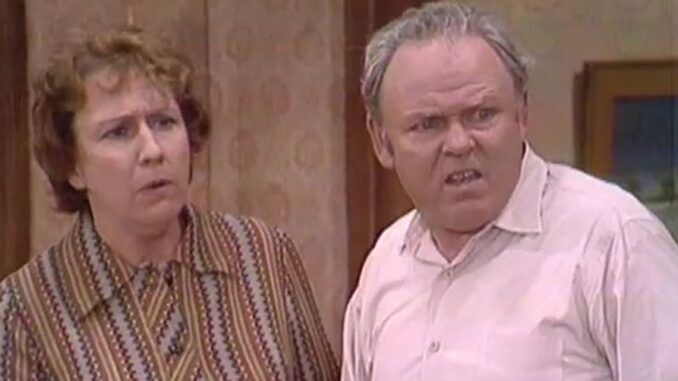
When All in the Family premiered on January 12, 1971, it became the show America didn’t know it needed. Created by Norman Lear and Bud Yorkin, the series faced initial skepticism from networks, with ABC deeming it “too controversial” before CBS took a chance on it. The show quickly gained attention for its bold portrayal of issues such as racism, sexism, and generational conflict, featuring the iconic characters of Archie Bunker, Edith, and their daughter Gloria, alongside Mike, Gloria’s liberal husband.
The first episode, “Meet the Bunkers,” aired without much fanfare, as CBS was unsure how to present a series centered on a bigoted protagonist. Surprisingly, the initial response was overwhelmingly positive, despite some critics labeling it a “sick joke.” As the series continued, it garnered high ratings and critical acclaim, including Emmy Awards, solidifying its place in television history.
The show’s audacity was matched by its willingness to tackle serious societal issues, making it a groundbreaking program. By its second season, All in the Family was a cultural phenomenon, addressing topics like women’s liberation and homosexuality in a way that resonated with viewers.
Lear famously noted that Archie was a “lovable bigot,” a complex character reflecting the struggles of a changing America. The series sparked national conversations about prejudice and societal norms, leading to debates on talk shows and in newspapers.
Throughout its run, All in the Family faced challenges, including conflicts between the show’s creators and CBS’s censors, as well as tensions with its star, Carroll O’Connor. Despite these hurdles, the show remained a ratings leader and continued to break ground, leading to multiple spinoffs like The Jeffersons and Maude.
In its later seasons, the show explored more serious themes, including Edith’s tragic storyline, which was executed with great sensitivity. As All in the Family wrapped up its run in 1979, it left behind a legacy of storytelling that has influenced countless shows since.
Even today, the impact of All in the Family is felt in contemporary television, where it paved the way for shows that reflect real-life issues and complexities. Its legacy continues to be celebrated through streaming, DVD releases, and live recreations, reminding viewers of the importance of dialogue in addressing social challenges.
As we commemorate 50 years since its debut, All in the Family stands as a testament to the power of television as a medium for reflection and change, shaping how stories can illuminate the realities of society
